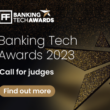BBVA warns of “dangerous bubble” for blockchain ICOs
 BBVA reckons the fever for initial coin offerings (ICOs) in blockchain must be cooled as the industry is facing a “dangerous bubble” driven by speculation.
BBVA reckons the fever for initial coin offerings (ICOs) in blockchain must be cooled as the industry is facing a “dangerous bubble” driven by speculation.
ICOs are a common story in fintech at present and they allow small businesses to reach a large audience via blockchain and cryptocurrencies. (And BBVA has its own interest in blockchain, as it was one of the financial institutions that recently jumped onboard Ripple’s blockchain network for cross-border payments.)
BBVA explains: “An old saying in investment states that when everyone is talking about how well the stock exchange is doing, that is the time to get out and invest in another asset type.
The bank adds that in the “small but growing community of Spanish experts and stakeholders of fintech and blockchain … it is time to hit the brakes on these [ICO] investments: a bubble has been created that has to burst as smoothly as possible.”
This opinion from BBVA was one of the main conclusions drawn at a roundtable organised by Blockchain España, in Madrid’s Impact Hub, concerning ICOs.
According to BBVA, from a legal standpoint in Spain, ICOs are currently in limbo, so current regulations can be applied to them for crowdfunding, for securities or for risk capital. “Only a handful of countries have taken the ICO bull by the horns”, adapting this form of funding to its country strategy, as was the case in Switzerland, Estonia and Singapore.
BBVA says it is calculated that various blockchain start-ups have already reached $380 million through ICOs.
The roundtable sounded lively as other views on ICOs and investment ranged from “irrational fever” to an “avalanche of greed”.
Xavier Foz, a lawyer specialising in fintech and blockchain from the law firm Roca y Junyent, recommends that limits be put on fundraising: “Does a start-up need $250 million? Not even Google or Facebook had that”, and highlighted the need for clear rules to be set for the use of that money by company managers.
Carlos Kuchkovsky, CTO of new digital business at BBVA, adds: “The first thing a start-up should do is ask itself whether or not it needs tokens. Then, whether or not it wants those tokens to be in many hands. Only at the fifth or sixth step should they be thinking about ICOs.”
So, what is the solution? According to BBVA, some suggest an outright ban on negotiating tokens on secondary markets in order to recover their essence: not being a tool for speculation, but rather a mark of confidence of a company that, with a bit of luck, will generate profits.
However, as the political and legal decisions begin to be taken regarding tokens, BBVA says perhaps people should remember, in line with Foz, that a token years ago was used to start up a bumper car. In other words, it was used to gain access to a service, and nobody bought one thinking they would effortlessly become a multimillionaire.
Banking Technology Awards 2017 are now open for entry!
Know any innovative products, inspirational projects, skilled teams or visionary leaders that deserve a special recognition this year? Nominate them for a Banking Technology Award!
Deadline for submitting the nominations is 25 August 2017.












































